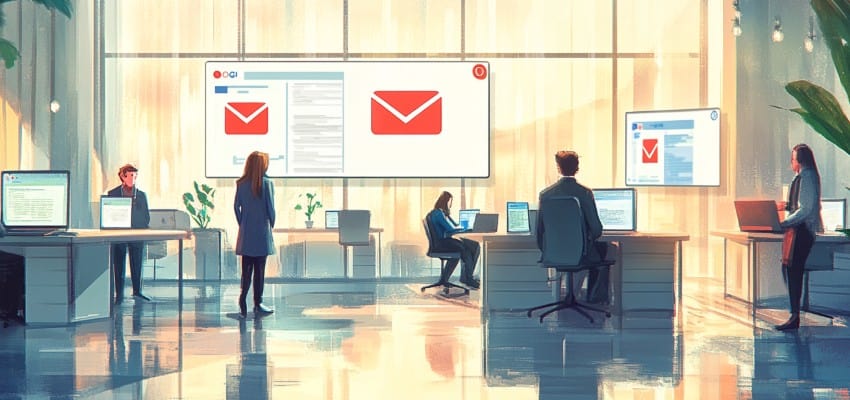Editor’s Note: Gmail’s new security enhancements signal a salient moment for cybersecurity, information governance, and eDiscovery professionals. As phishing attacks grow increasingly sophisticated, Google’s move to deploy end-to-end encryption underscores both the promise and complexity of protecting digital communications. This article navigates the evolving threat landscape surrounding Gmail, examining how new protections, lingering vulnerabilities, and the balance between user privacy and security are reshaping the email ecosystem. A must-read for professionals tasked with safeguarding sensitive information in a rapidly shifting environment.
Content Assessment: Navigating Gmail's New Encryption and the Rising Tide of Phishing Threats
Information - 93%
Insight - 91%
Relevance - 92%
Objectivity - 90%
Authority - 90%
91%
Excellent
A short percentage-based assessment of the qualitative benefit expressed as a percentage of positive reception of the recent article from ComplexDiscovery OÜ titled, "Confronting Gmail's New Encryption and the Rising Tide of Phishing Threats."
Industry News – Data Privacy and Protection Beat
Confronting Gmail’s New Encryption and the Rising Tide of Phishing Threats
ComplexDiscovery Staff
Gmail is under siege. As phishing threats grow more advanced, Google’s flagship email service, with nearly two billion users, has become both a fortress and a battleground. While Google races to deploy end-to-end encryption and AI-enhanced defenses, cybercriminals are adapting just as fast. The company’s latest moves highlight a deeper challenge facing cybersecurity, information governance, and eDiscovery professionals: protecting users without sacrificing privacy or convenience.
In recent developments, Google’s Gmail platform has become a focal point of cybersecurity discussions due to its ongoing battle with sophisticated phishing attacks. Google’s spokesman, Ross Richendrfer, confirmed that the tech giant is fully aware of these threats and has implemented robust protections to counter them. This comes amid continuous reports of new Gmail threats and the introduction of updates designed to reinforce email security. However, these updates have been met with mixed reactions from security experts.
Google’s recent announcement of end-to-end encryption for its Gmail service marks a significant step toward enhancing email security. While the implementation of encryption is generally considered beneficial for privacy and security, potential pitfalls remain. Jérôme Segura, senior director of threat intelligence at Malwarebytes, expressed concerns over users’ familiarity with legitimate invitation processes, which could be exploited by scammers in phishing campaigns.
The new security measure, however, comes with a caveat. Emails that employ this encryption can be automatically decrypted for Gmail users, but may pose a challenge for recipients on other platforms. These recipients are invited to view the encrypted email within a restricted version of Gmail using a Google Workspace guest account. This could potentially lead to confusion and susceptibility to fake invitations designed to capture user credentials.
The risk of phishing attacks is not limited to Gmail alone. All email platforms are susceptible to fraudulent alerts and malicious links, which can lead to security breaches. Google’s “subpoena attack,” where emails appeared as bona fide communications from Google, exemplifies this threat. These emails, although originating from legitimate Google domains and successfully passing authentication checks, were used to mislead users into compromising their account security.
Recent articles have highlighted how phishing attacks exploit Google’s authentication processes, allowing crafted emails to seem genuine. For instance, a bogus email alert from “no-reply[at]google.com” claiming to include a subpoena fooled many users into interacting with malicious content despite Google’s efforts to filter such emails.
Moreover, Google’s attempts to reform user account security by encouraging multi-factor authentication and alerting users about sophisticated scams have been persistent. They have advised users to utilize passkeys and more secure forms of two-factor authentication beyond the now-phased-out SMS methods.
Richendrfer consistently emphasizes that Google will never solicit personal account credentials through any communication medium, a point that cannot be overstressed given the advances in scamming techniques.
This elongated scenario brings to light the broader issue of data privacy versus user convenience. Google’s rollout of AI-enhanced features for Gmail, which necessitate access to personal data, has sparked privacy debates. The AI functionalities aim to fine-tune email management with intelligent search results and predictive text suggestions but require access to users’ behavioral data.
Google has maintained that while its AI analyzes inbox activities, this information is not directly employed for ad targeting in Gmail, although it could influence the user’s Google profile. The decision to enable such AI features ultimately rests with the users, who must weigh enhanced functionality against the backdrop of increased data collection.
Gmail’s evolution shows that the fight for secure communication is never static. As phishing attacks grow sharper and defenses more sophisticated, professionals in cybersecurity, information governance, and eDiscovery must navigate a landscape where privacy, convenience, and security are in constant tension. In this ongoing battle, staying informed and staying vigilant is the new baseline for resilience.
News Sources
- Gmail Warning: Google Tells Users to Ditch This Setting (Newsweek)
- Google Confirms Gmail Update—How To Keep Your Email Account (Forbes)
- Google says Gmail users need to make these security changes now to avoid hacking scams (mlive)
- Google Responds To Hack Attacks — Confirms New Gmail Update (Forbes)
- New Gmail Feature Leaves Millions Of Email Users Open To Attack (Forbes)
Assisted by GAI and LLM Technologies
Additional Reading
- When Innovation Meets Regulation: The DeepSeek Privacy Controversy and Its Compliance Fallout
- From Consent or Pay to AI Oversight: EDPB Expands Its Regulatory Reach in 2024
Source: ComplexDiscovery OÜ


























